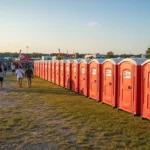Waste management is crucial to maintaining a clean and safe environment. However, not all items can be thrown in your regular trash bin. Certain types of waste require special handling due to their hazardous nature or physical properties. This article explores the types of trash waste management companies typically cannot accept and offers practical solutions for safely and responsibly disposing of these materials.
Medical Waste
Medical waste is considered a biohazard because it often contains bodily fluids such as blood, urine, or tissue, which can spread disease quickly. Hospitals have specific containers for used syringes and gauges to ensure safe disposal. If you use similar items at home, such as needles for insulin or other medication, it is crucial not to place them in your regular garbage container. Instead, dispose of them properly using designated medical waste disposal services to ensure safety and prevent the spread of infections. Protect your health and the health of others by handling medical waste responsibly.
Tires
Tires undergo significant wear and tear, but disposing of them in the trash is not advisable. Tires are large and made of rubber, posing a challenge for typical garbage removal companies. They can also become a breeding ground for pests when improperly discarded. If your tire has reached its end of life or is damaged, recycle it during your next auto servicing appointment or take it to a specialized recycling center. Many tire retailers and automotive shops offer recycling programs for old tires. By recycling tires, you help reduce landfill waste and contribute to a cleaner environment.
Ink and Paints
Some paints contain strong solvents with hazardous fumes that are flammable, making them unsuitable for regular trash disposal. Waste haulers may be unable to distinguish if your paint is environmentally safe or hazardous, so avoid putting paint in the trash unless the container is visibly empty. Additionally, be cautious with ink, which can stain bins or processing machines. To dispose of these items safely, take them to a hazardous waste collection event or facility. Check with your local waste management company for specific guidelines and drop-off locations. Proper disposal of paints and inks ensures that harmful chemicals do not pollute our environment.
Construction Debris
Most waste management companies cannot process rubble from construction sites, including bricks, concrete, tile, mulch, dirt, or any other heavy materials used in construction. While small amounts may be acceptable, larger quantities can be too heavy for processing machines. Consider renting a dumpster for construction debris or taking it to a landfill or processing center. This ensures that the debris is handled correctly and does not cause damage to waste management equipment. Properly managing construction debris helps keep our communities clean and safe.
Moldy Items
Mold can be hazardous to health, causing upper respiratory infections, asthma, and allergic reactions. Black mold, in particular, is toxic and requires special handling. Some companies will not accept materials like moldy drywall or other items. Check with your local trash hauler to see if they have the facilities to dispose of moldy items. Alternatively, a mold remediation service may be necessary to remove and dispose of these hazardous materials safely. Ensuring moldy items are disposed of correctly protects both human health and the environment.
Asbestos
Asbestos, a highly dangerous material once used for insulation before the 1980s, has been linked to lung cancer and other serious health issues. Some older homes and buildings may still contain asbestos. If you suspect you have encountered asbestos, do not touch it. Contact a professional for safe removal and disposal. Only licensed asbestos removal contractors should handle this material to ensure safety and compliance with regulations. Safe asbestos disposal prevents toxic exposure and protects public health.
Household Cleaners
Many garbage contractors do not accept household cleaners containing harsh chemicals unsuitable for landfills or regular garbage processing. However, empty bottles are generally acceptable. Always check with your waste management company for specific guidelines. For full or partially-used containers, consider taking them to a hazardous waste collection site to prevent environmental contamination and ensure safe disposal. Properly disposing of household cleaners helps maintain a healthy ecosystem.
Flammable Items
Most garbage companies cannot accept flammable items like gasoline for safety reasons. Flammable substances could ignite other trash, creating a significant safety hazard. If you need to dispose of flammable substances, seek professional assistance. Contact your local hazardous waste disposal service for proper handling and disposal methods to prevent accidents and environmental harm. Proper disposal of flammable items ensures safety and reduces environmental risks.
Conclusion
Waste management is a significant business in the United States, but not all items can be thrown in your bin. Whether you’re spring cleaning, renting containers for an event, or moving, ensure your waste management company accepts all your waste. By understanding the types of waste that require particular disposal and taking the necessary steps to handle them properly, we can all contribute to a safer and cleaner environment.
For experienced trash-hauling professionals, contact our team at Trash Rangers. We offer reliable weekly service with text reminders and no hidden fees. Let us help you dispose of your waste responsibly and keep our environment clean.
We look forward to assisting you with your waste removal needs.



